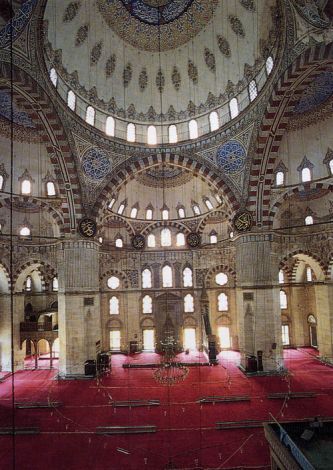FRAGRENT SOAPS
Selimiye Mosque, the Seljuk period Eski Mosque renowned for its calligraphic inscriptions, and iç Serefeli Mosque with its famous minaret are what come to mind first when we think of Edirne today. Yet until a century or so ago the city was not associated with its architecture alone, but also with fragrantly scented fruit soaps. If these were still being widely made in Edirne today, they would undoubtedly take second place after Selimiye Mosque among the city’s attractions. Perfumed soap is thought of as a modern innovation, yet it was being made here at least three hundred years ago. In Arasta çarsisi overshadowed by Selimiye Mosque, one of the greatest masterpieces of Ottoman classical architecture, you can track down this traditional local product, the last to survive the inroads of modern industry. In the windows of the arasta’s tiny shops, each ten to fifteen square metres in area, can be seen what looks like plastic fruit, unworthy of a second glance. But those in the know are appreciative. Moulded into the form of apples, pears, peaches, grapes, cherries, bananas, melons, strawberries, apricots, and lemons, these soaps were Edirne’s main article of trade in the 19th century.
Today it is widely recognised that essential oils obtained from plants are beneficial when breathed in or absorbed through the skin, and the fruit soaps of Edirne were not merely an attractive novelty but had a therapeutic function. They were the ancestors of today’s lemon, peach, apple and apricot scented soaps and shampoos. They are made from natural green soap, which is melted down and mixed with rose oil and fruit scented essences. When cooled, the soap is moulded into the appropriate shape and then painted.
The fruit soaps which are today looked upon only as decoration, were an essential part of the bathing ritual in the past. In the early 19th century soap making was one of the main crafts of Edirne, and even in the last quarter of the century and early 20th century there were over forty shops selling fruit soaps in the city’s bazaars. There is even a district in Edirne called Sabuni, from sabun, the Turkish word for soap. Large quantities of the soap made here was sent to the palace in Istanbul for the use of the sultan’s wives and daughters, and the other women of the palace. These soaps were a part of trousseaus, and even sent by the sultan as diplomatic gifts to other rulers. The palace women placed these soaps in a corner of their rooms to enjoy their fragrance.
Among the craftsmen who kept the art of fruit soap making alive into the mid-20th century were Mehmet and Basri Ergörsel, and a soap maker named Resat, whose surname is now forgotten.Today, however, only one soap maker continues to produce fruit soaps by more or less traditional methods. Sales have plummeted, and few of the original soap shops now remain. The principal demand comes from the governor’s office and themunicipality, which maintain the custom of presenting fruit soaps as gifts to visiting dignitaries. The last living maker of fruit soaps, Selahattin Usta, is nearly 80 years old and there is no one else left to carry on. The only consolation is that Edirne Domestic Science College students produce limited amounts of the fruit soaps for which Edirne was once celebrated far and wide.
Reference: Abdullah Kiliç / Skylife
Some selected examples (please click on pictures to enlarge):








